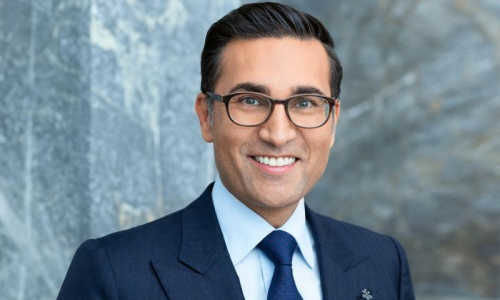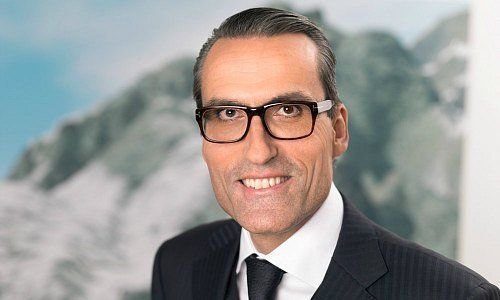Banking Barometer 2019: UBS
The definitive guide to the highs and lows of 2019: finews.asia features a year-end wrap for four banks with the highlights of the past year. First up, UBS.
The highlight of the year for the world’s largest private bank was not a financial milestone but a high-profile hire. Any conversation around private banking in the third quarter of 2019 invariably circled back to UBS and its audacious decision to take on Credit Suisse heir-apparent, Iqbal Khan (pictured below), as its new co-head of wealth management.
The move was declared a triumph even before Khan’s first day on the job, with stakeholders offering various theories about its significance. Most agreed that by looking externally for a new leader, UBS had drawn a line under its history of promoting loyal but unproven internal candidates, often with dubious success. With one fell sweep, the bank had reiterated its position as the industry leader, while managing to appear both humble and light-footed.
Daring Plan

Although it is too early to tell whether Khan will bring either client assets or bankers in his wake, the move has bolstered UBS' standing from a public relations perspective. If 2018 was the year of investment banking guru Andrea Orcel’s ungainly departure from the bank, then 2019 has been defined by its daring plan and deft execution to hire away the future of its closest rival.
UBS boss Sergio Ermotti did not pull any punches when he said the question for Swiss banks was no longer whether they «were too big to fail but too small to survive» and he wasted no time in taking his own advice. In June this year, UBS became the majority partner in a joint venture with Japanese financial behemoth Sumitomo Mitsui, redoubling its efforts to capture a share of the $17 trillion saved by Japanese households.
Another Joint Venture
Hamstrung by an equities license that did not allow it to leverage the full weight of its franchise with clients, UBS had $20 billion in assets under management (AUM) from the third-largest economy in the world prior to the partnership, a figure that it now expects to double over the next five years.

A few months later, UBS unveiled yet another joint venture, this time with Banco do Brasil, to position its investment bank as a contender in the country’s booming capital market. Consistent in its strategy, UBS once again took the majority stake whilst inking a partnership with the market leader – like Sumitomo Mitsui in Japan, Banco do Brasil is the largest onshore player in Brasil, with $366 billion in client assets. Once again, the bank expects the partnership will help it leapfrog competitors in the country’s investment banking league tables within a short period of time.
Bling is In
Perhaps taking its cue from «Crazy Rich Asians» – the Singapore-based movie fostering the stereotype about «bling being in» – UBS recently received the keys to 381,000 square feet of prime office space in one of the most expensive shopping districts in the world. Work is currently underway to fit out the interiors at 9 Penang Road in the bank’s signature white, and 4,000 employees and some of the best pieces from its global art collection are slated to move into the premises in the second half of 2020.
The move is highly-anticipated, having been covered extensively in the local news and will be seen as a counterpoint to the bank’s Hong Kong presence which was thus far its most extensive in the region. Interestingly, the new Singapore office, along with its relatively new office in Kowloon confirm the wealth manager's preference for splashy shopping districts rather than central business districts in Asian cities.
Are Billionaires Smarter?
Industry research reports from banks are rarely the subject of debate, but a November 2019 report by the wealth management division at UBS did the bank’s reputation as a thought leader more harm than good when it claimed billionaires are inherently smarter risk-takers.
«The billionaire effect can be attributed to billionaire’s appetite for smart risk-taking and their greater willingness to plan and invest for the long term,» stressed the report, prompting critique that the bank had adopted flawed metrics to cozy up to prospective clients.
Particularly Smart Owners

A «Financial Times» analysis found the assertion was «completely unsupported by the evidence» and likened it to claiming house prices were rising because the sample set did not include any homes whose values were lower. Josef «Joe» Stadler (pictured above), head of the bank’s ultra-high net worth practice, who is widely quoted in the report, was taken to task for saying «billionaires are creating and steering businesses that consistently outperform equity markets» even though there was no demonstrable direct causation between businesses that outperformed and whether or not their owners were billionaires. Indeed, it could be that business owners who are billionaires owe their wealth to outperforming businesses rather than the assumption that businesses owe their outperformance to, particularly smart owners.
Stadler perhaps took the argument too far by going on to say, «this business acumen has also translated into their philanthropy, as billionaires seek new ways to engineer far-reaching environmental and social change,» a phenomenon he refers to as the «billionaire effect.»
While UBS may not have been able to prove its fantasy of billionaires being better at business; philanthropy; environmental and social change, it did offer compelling evidence of why the bank may not have the best understanding of the client demographic it purports to serve.
Concealing Conflict

A $51-million fine may seem like a slap on the wrist compared to what banks have already paid out to regulators around the world, but the amount marks one of the largest ever penalties meted out by Hong Kong’s Securities and Futures Commission (SFC). UBS found itself on the receiving end of the regulator’s censure for failing in its fiduciary duty to clients.
The SFC found UBS had failed to disclose when it interests conflicted with those of clients as well as consistently overcharging clients from 2008 to 2017. The SFC further stated that it had uncovered «serious systemic internal control failures» at the bank, an allegation that is unlikely to go down well with notoriously price-sensitive Asian clients.
Overcharging Clients,
The bank’s flagship wealth management division was at the center of the storm, the bank was found to have increased the spread it charged to clients on trades without their knowledge and after the trade had already been executed. Damningly, the overcharging was repeated on bond and structured notes transactions on 5,000 Hong Kong managed client accounts across 28,700 transactions.
Financial intermediaries, asset managers who have found rapid popularity with Asian tycoons, were found to have colluded with the bank and executed trades on their client's behalf in order to conceal the overcharging. UBS agreed to pay $25 million to the clients it had wronged.




























